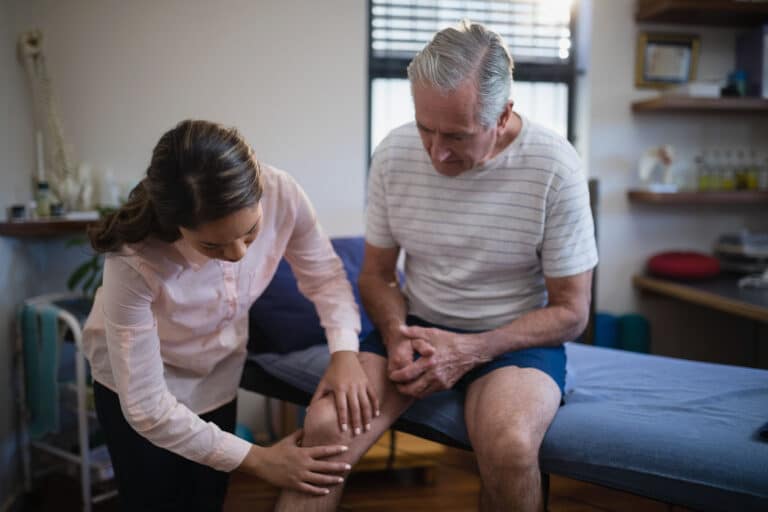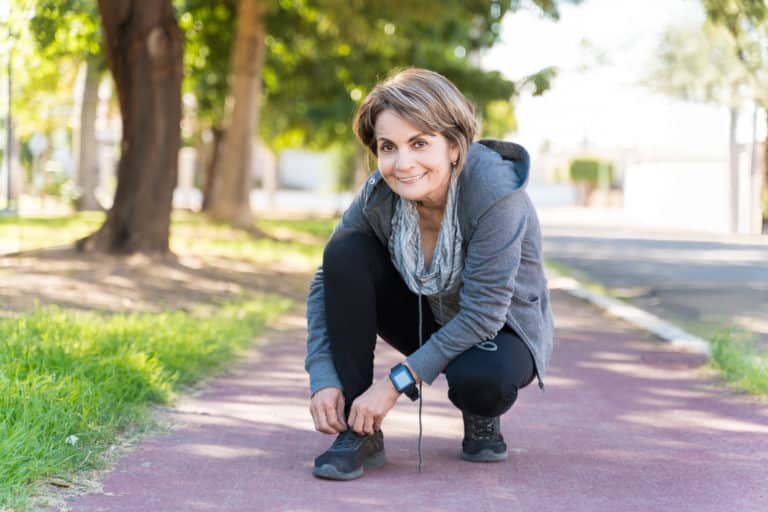Rheumatoid arthritis (RA) is a chronic inflammatory condition that affects the joints, causing pain, stiffness, swelling, and reduced mobility. For many older adults, RA can significantly impact their quality of life.
However, living with RA doesn’t mean you must give up on your daily activities or hobbies. In fact, like many of my patients, you can find ways to take care of yourself and manage your symptoms through good self-care practices.
In this article, I’ll share some of the most effective self-care practices for RA that I’ve learned in my experience as a physical therapist. I will also provide practical tips and advice on incorporating these self-care practices into your daily life.
By the end of this article, you should better understand how self-care can help you manage your RA symptoms and improve your quality of life.
Self-Care for Rheumatoid Arthritis
With chronic conditions like RA, self-care is essential in managing your symptoms and optimizing your quality of life. Self-care practices are actions you can do to improve your physical, mental, and emotional well-being.
Although ideal self-care strategies will vary, many of my patients can find a few that help them cope with stress, reduce inflammation, prevent complications, and enhance mobility.
Here are some of the most effective self-care practices for managing RA:
Quitting Smoking
Smoking is one of the worst things you can do for your health, especially if you have RA. In fact, smoking can worsen your symptoms, increase your risk of developing other diseases, and reduce the effectiveness of your medications.
I encourage my patients to quit smoking to improve their general health. Quitting can improve your lung function, lower your blood pressure, reduce pain and stiffness, and improve your response to RA treatment. Quitting smoking can also lower your risk of developing heart disease, stroke, cancer, and other serious conditions that affect the health of many seniors.
If you’re a smoker, quitting won’t be easy, but it is possible. In today’s modern world, many resources and support options are available to help you quit smoking, with very high success rates. Of course, I always recommend talking to your primary care doctor about nicotine replacement therapy, medication, and other options that may work before starting any new treatment.
To manage some of the psychological challenges of quitting smoking, you can join a support group or use online tools to help you quit smoking. The most important thing is to make a plan, believe in yourself, and stick to it.
Weight Management
Not only can being overweight or obese increase your risk of developing many common health problems among older adults, but it can also worsen your RA symptoms. For this reason, I always educate my patients on simple weight management strategies to help alleviate these risks.
Excess weight stresses your joints, especially your knees, hips, and ankles. Obesity can also cause more inflammation throughout your body, triggering more pain and swelling in joints affected by RA.
Finally, assistive devices, such as a cane or walker, are among the most common self-care solutions for older adults with RA, and being overweight may make it difficult to stop using these devices long-term.
The good news is that weight management can help you reduce your RA symptoms and improve your overall health. For example, losing weight can reduce stress on your joints, lower your inflammation levels, and improve your mobility. As a bonus, it can also lower your risk of developing diabetes, high blood pressure, high cholesterol, heart disease, and other significant issues for seniors.
Healthy Choices, Not Just Limited Ones
As I always tell my patients, weight management isn’t just about following a strict diet or eating food you don’t enjoy. It’s about making healthy choices and changing your eating habits sustainably that benefits your overall health.
Of course, you can never go wrong by eating a balanced diet that includes plenty of fruits, vegetables, whole grains, lean protein, healthy fats, and water.
For managing RA, limiting your intake of processed foods, added sugars, and alcohol can also be beneficial. Every person’s body is different, so I recommend consulting a nutritionist or a dietician for more guidance on optimizing your diet for your needs.
In most cases, it’s essential to focus on moderation rather than exclusion. This means you don’t need to deprive yourself of what you enjoy. Finding ways to enjoy them in moderation can be just as helpful. This approach takes your emotional health into consideration when changing your diet.
Exercise and Physical Activity

Exercise and physical activity are essential for maintaining your health and well-being if you have RA. This is because exercise can help you improve your joint function and mobility, reduce your pain and stiffness, increase your muscle strength and endurance, improve your balance and coordination, and boost your mental health.
What’s the Difference Between Physical Activity and Exercise?
As a physical therapist specializing in exercise, I must clarify that exercise and physical activity differ.
Exercise is a planned, structured, and repetitive movement that aims to improve or maintain one or more aspects of physical fitness.
Physical activity is any movement that uses energy, such as walking, gardening, or doing household chores. Both exercise and physical activity benefit people with RA, but they have different effects on the body.
While physical activity can positively affect your health and well-being, exercise is often the component that older adults need to improve their routines. Exercise can help you maintain a healthy weight, reduce stress, and improve your energy levels in a structured way. This leads to many benefits, including allowing you to prevent or manage other chronic conditions such as diabetes, high blood pressure, high cholesterol, and depression.
The amount and type of exercise you need will vary depending on your age, health status, and personal goals. Working with a physical therapist or an exercise specialist is the best way for many older adults to design a safe and effective exercise program for managing RA.
A PT can help you choose the right type, intensity, frequency, and duration of exercise or physical activity. They can also teach you how to perform the exercises or activities correctly, warm up and cool down properly, and modify your program.
Tips for Exercising Safely
I usually provide my patients living with RA with a set of basic exercise guidelines to stay safe:
- Start slowly and gradually increase your intensity and duration of exercise or activity. Do not overdo it or push yourself too hard. Listen to your body and stop if you feel any pain, discomfort, fatigue, or shortness of breath.
- Aim for at least 150 minutes of moderate-intensity aerobic exercise per week, 75 minutes of vigorous-intensity aerobic activity per week, or a combination of both. You can break up your exercise into shorter sessions of at least 10 minutes each throughout the day.
- Aim for at least two sessions of resistance exercise per week, targeting all the major muscle groups of your body. You can use weights, bands, machines, or your body weight as resistance. Start with light weights or low resistance and gradually increase as you get stronger.
- Aim for at least two sessions of flexibility exercise per week, targeting all the major joints of your body. You can use static stretching, dynamic stretching, yoga, tai chi, or pilates as flexibility exercises.
- Be physically active throughout the day as much as possible. Try to reduce the amount of time you spend sitting or lying down. Move around every hour or so to prevent stiffness and improve circulation.
- It’s also important to note that low-impact exercise is generally better for joint issues. For example, try brisk walking instead of running, which can be more jarring for sensitive joints. Swimming, aquatic exercise, and cycling are popular low-impact exercises you may consider.
Getting Good Sleep
Good sleep is an essential self-care practice for any older adult for RA and other health conditions. Sleep is vital for restoring your energy levels, which is especially important because fatigue (low energy levels) is one of the most prominent issues among patients with RA. Sleep is significant in healing, injury recovery, mood, concentration, and pain perception.
However, getting good sleep can be challenging for people with RA. As many of my patients report, RA symptoms such as pain and stiffness can interfere with falling or staying asleep.
Some medications for RA can also cause side effects that can impact sleep quality. Over time, poor sleep can worsen RA symptoms.
As I tell my patients, you should aim for at least seven to nine hours of uninterrupted sleep per night (some people may need more or less) and consult your doctor if you have trouble sleeping regularly. For some older adults with RA, sleep disorders such as sleep apnea can significantly affect sleep quality and should be addressed as soon as possible.
Some of the advice that I typically give my patients with RA for getting good sleep include:
- Go to bed and get up at the same time every day (including on weekends).
- Avoid stimulants such as caffeine and alcohol close to bedtime, as these can interfere with your ability to sleep soundly.
- If possible, avoid eating close to bedtime. While we typically don’t think of this, eating before bedtime can cause sleep disruption.
- Develop a relaxation routine before going to bed that you can maintain consistently. It’s essential to associate your bed mainly with sleep. Avoid using screens (television, phones, tablets) once you’re in bed.
- Make sure your bedroom is a relaxing place. For best results, your room should be dark and quiet with a comfortable temperature.
Dental Care
Although easy to overlook, dental care is another essential self-care practice for RA. RA can cause problems such as gum disease (periodontitis), tooth decay, tooth loss, and dry mouth.
Dental care can have many benefits for older adults with RA because it can help reduce oral inflammation, pain, and risk of infection. It may also help prevent or mitigate RA flares by lowering overall inflammation for some people.
A few helpful tips for dental care with RA include:
- Use a soft-bristled or electric toothbrush to clean your teeth gently and effectively. Use a toothbrush with a large or ergonomic handle to make it easier to grip and control.
- Use dental floss or an interdental cleaner to clean your teeth and remove plaque and food particles. You can also want to use a floss holder or a water flosser to make reaching and cleaning all areas of your mouth easier.
- Use fluoride toothpaste and mouthwash to strengthen your enamel and prevent tooth decay. You may also want to use a mouthwash that contains antibacterial agents to prevent gum disease.
- Avoid tobacco products such as cigarettes, cigars, or chewing tobacco. Tobacco can damage your oral tissues, stain your teeth, worsen your RA symptoms, and even reduce the effectiveness of your medications.
- Limit your intake of sugary foods and drinks such as candy, soda, or juice. Excess sugar can feed the bacteria that cause plaque and tooth decay.
Because I’m not a dentist, I always encourage patients to discuss their pressing oral health questions with an appropriately licensed professional.
Stress Management
Stress management can help you cope with the physical, emotional, and social challenges of living with RA. While many patients don’t realize this, stress can worsen RA symptoms and increase inflammation. Stress can also affect your overall mood and pain sensitivity.
Effective stress management techniques can help you reduce stress levels, inflammation, and risk of complications such as cardiovascular disease or depression. More importantly, older adults with RA who practice stress management are likelier to enjoy a higher quality of life.
It’s always best to consult a mental health professional before seriously changing your mental health self-care routine. However, here are a few tips for better stress management that I often share with my patients:
- Identify and avoid or reduce the sources of stress in your life. You may want to keep a stress diary to track what causes you stress, how you react to it, and how you cope with it.
- Seek and accept support from others who can help you cope with stress. You may want to talk to someone you trust, such as a family member, friend, counselor, or therapist, about your feelings and concerns. You may also want to join a support group or an online community for people with RA or similar conditions where you can share your experiences.
- Practice relaxation techniques that can help you calm your mind and body. Try deep breathing, meditation, progressive muscle relaxation, yoga, tai chi, or massage. Try multiple approaches and see what works best for you.
- Seek or create opportunities for social interaction and connection. You should spend time with people who are supportive and understanding of your condition.
Living with Rheumatoid Arthritis
Living with rheumatoid arthritis can be challenging, but it doesn’t have to stop you from enjoying your life. You can cope with the physical, emotional, and social aspects of the condition and improve your well-being in many ways.
Finding Support
A strong support network can make a big difference in coping with RA. Support can come from various sources, such as your family, friends, healthcare team, support groups, online communities, or organizations. Good support can provide emotional comfort, practical help, and motivation when living with RA.
While I provide a lot of emotional support to my patients with chronic conditions, here are a few tips for finding other avenues:
- Communicate openly and honestly with your loved ones about your condition, needs, feelings, and expectations.
- Speak with your professional healthcare team regularly, such as your doctor, physical therapist, occupational therapist, rheumatologist, or psychologist. They can provide you with medical care, education, guidance, counseling, or referrals to other resources.
- Join a support group or an online community for people with RA or similar conditions. These groups allow you to share your experiences, learn from others, get tips and advice, and stay inspired.
- Get involved in an organization or a charity that advocates for people with RA or raises awareness and funds for a good cause. By volunteering, donating, or participating in events, you can better identify with and live with your condition.
Staying on Top of Your Treatment Plan
As a physical therapist with years of experience helping older adults navigate chronic health issues, I consider treatment plan adherence a significant priority for managing your RA symptoms and preventing complications.
Your treatment plan for RA may include medications, physical or occupational therapy, or complementary therapies such as a fitness class. Regardless of the specifics, staying consistent will ultimately determine whether or not you get the most results possible from your plan.
You can stay on top of your treatment plan by:
- Taking your medications as prescribed by your doctor.
- Following the instructions and recommendations of your physical therapist or occupational therapist.
- Keep track of your symptoms, medications, appointments, and test results.
- Communicating regularly and effectively with your healthcare team. This means asking questions, reporting any changes or concerns, and providing feedback on your treatment plan.
- Being proactive and informed about your condition and your treatment options. Learn as much as possible about RA and its management from reliable sources. Discuss with your doctor any new or alternative treatments you are interested in or curious about.
Coping with the Emotional and Social Aspects of RA
As a chronic health condition, RA can affect your physical and emotional well-being. Many patients report anger, sadness, fear, frustration, or loneliness. While navigating your condition, you may also struggle to maintain or develop relationships, work, hobbies, or your favorite leisure activities.
Support from your healthcare team is the first line of defense for coping with RA’s emotional and social aspects. When your medical treatments are lined up correctly, and you’re properly educated on your condition, you’re better positioned to mitigate the complications of RA from their source.
Support from friends and family is the second line of defense for coping with RA. This is because when you have people to talk to and interact with who aren’t part of your medical team, you’re better positioned to enjoy the aspects of your life that aren’t directly related to managing your RA. In fact, I’ve had many patients tell me that their social support group is the most important contributor to maintaining their high quality of life despite living with chronic health conditions.
Key Takeaways
- Rheumatoid arthritis (RA) is a chronic inflammatory condition that affects the joints and other parts of the body. It can cause pain, stiffness, swelling, and reduced mobility and function. RA can also affect your quality of life and well-being.
- Self-care practices are actions you can do to improve your physical, mental, and emotional well-being. They can help you cope with stress, reduce inflammation, prevent complications, and enhance your health.
- Some of RA’s most effective self-care practices are quitting smoking, weight management, exercise, physical activity, getting good sleep, dental care, and stress management.
- Living with RA can be challenging, but it doesn’t have to stop you from enjoying your life. You can cope with the condition’s physical, emotional, and social aspects and improve your well-being in many ways.
- Finding support from your family and friends, staying on top of your treatment plan, and coping with the emotional challenges of RA can significantly impact your long-term quality of life.
If you’re living with RA, remember you are not alone. Many resources are available to help you along the way. If you have any questions about RA, speak with your healthcare provider.
FAQs
What is rheumatoid arthritis?
Rheumatoid arthritis (RA) is a chronic inflammatory condition that affects the joints and other parts of the body. It is an autoimmune disease, which means that the immune system mistakenly attacks the body’s healthy tissues, causing inflammation and damage. RA can cause pain, stiffness, swelling, and reduced joint mobility and function. RA can also affect other body parts, such as the skin, eyes, lungs, heart, and blood vessels. RA can significantly impact the quality of life and well-being of the people who have it.
What causes rheumatoid arthritis?
The exact cause of RA is unknown, but it is believed to be influenced by a combination of genetic and environmental factors. Some people may have a genetic predisposition to develop RA, meaning they inherit specific genes that make them more likely to have RA. However, having these genes does not mean that they will develop RA.
How is rheumatoid arthritis diagnosed?
There is no single test that can diagnose RA. The diagnosis is based on medical history, physical examination, blood, and imaging tests. Medical history and physical examination can help identify the signs and symptoms of RA, such as joint pain, stiffness, swelling, and reduced mobility.
How is rheumatoid arthritis treated?
There is no cure for RA, but many treatments are available that can help manage the symptoms and prevent or slow down the progression of the disease. The treatment plan for RA may include medications, injections, physical or occupational therapy, or complementary therapies. This treatment plan may also change over time depending on your response, preferences, and any new developments in your condition.
References
- Veitiene, D., & Tamulaitiene, M. (2005). Comparison of self-management methods for osteoarthritis and rheumatoid arthritis. Journal of rehabilitation medicine, 37(1), 58–60. https://doi.org/10.1080/16501970410032669
- Manning, V. L., Hurley, M. V., Scott, D. L., Coker, B., Choy, E., & Bearne, L. M. (2014). Education, self-management, and upper extremity exercise training in people with rheumatoid arthritis: a randomized controlled trial. Arthritis care & research, 66(2), 217–227. https://doi.org/10.1002/acr.22102
- Pope J. E. (2020). Management of Fatigue in Rheumatoid Arthritis. RMD open, 6(1), e001084. https://doi.org/10.1136/rmdopen-2019-001084





